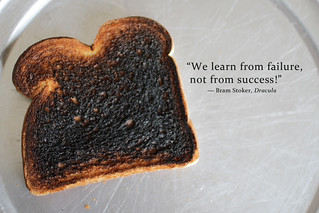Teams and individuals who are winning, are often the poorest at learning - a particular form of "winner's curse".
Who learned more about Tank Warfare from World War One? Was it the victorious Americans, British and French, or the losing Germans?
It was, of course, the Germans.
The story below is taken from a review of a book by Max Boot.
"The British military and government, before Churchill became Prime Minister, lost interest in tanks. In France, Captain Charles de Gaulle was interested in fast-moving mechanized warfare, but the French military favored defensive warfare and firepower. The United States also devoted little interest in armored warfare. Writes Boot:The Winners' curse is that the winner often fails to learn, and so is overtaken in the next competition by the loser. That's why Germany overtook the Allied powers in terms of tank warfare in 1939, and the loser became winner for a while. Winners are complacent, and reluctant to change. Losers are eager not to lose again.
"The U.S. had deployed a Tank Corps in World War I, but it was disbanded in 1920 over the anguished objections of two of its leading officers -- Colonel George S. Patton and Major Dwight D. Eisenhower."It was the Germans who were most interested in fast-moving mechanized warfare. Writes Boot:
"Around 1934, Colonel Heinz Guderian, chief of staff of the Inspectorate of Motorized Troops, gave the Fuehrer [Adolf Hitler] a short tour d'horizon of tank warfare. "Hitler," Guderian wrote, "was much impressed by the speed and precision of movement of our units, and said repeatedly, "that's what I need! That's what I want!'""In 1939 Hitler had a three-hour parade of mechanized forces. Fuller was there, invited because of his fascist sympathies. Hitler said to him, "I hope you were pleased with your children." Fuller replied:
"Your Excellency, they have grown up so quickly that I no longer recognize them".
We often see this "Winner's Curse" in our Bird Island KM exercises, where the team that builds the tallest initial tower seems to learn the least from the others (and often from the Knowledge Asset as well). Very often they are not the winning team at the end of the exercise.
The very fact that a team is ahead in the race, means that they have less incentive to learn. So the team with the tallest tower "relaxes" a bit. The best learners are often the teams with the second-tallest tower, as they know that with a little bit of learning effort, they can be in the lead. Also there seems to be a tendency to learn more readily from failure, than from success.
The story of the Wright Brothers is another example - having developed the first effective aeroplane, they failed to learn and optimise their design, and were eventually outcompeted. Their design became obsolete and the Wright Brithers went out of business.
Beware of the Winner's Curse in your KM programs. Ensure the winning teams also continue to learn. Capture lessons from successes and failures, and encourage even the winners to keep pushing to do even better. Learning from failure is psychologically easier, but learning from success allows success to be repeated and improved.





No comments:
Post a Comment